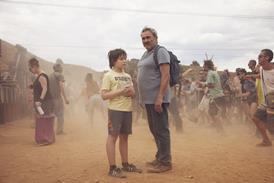Pablo Larrain’s high-concept Netflix drama featuring Augusto Pinochet as an ageing vampire lacks bite

Dir. Pablo Larrain. Chile. 2023. 110mins
It is clear from early on in the proceedings that Pablo Larrain’s El Conde is the arthouse version of high-concept: an elevator pitch to Netflix HQ. Chile’s venal dictator Augusto Pinochet as a vampire, faking his death in 2006 and now lurking around the country’s photogenically distressed southern tundra wearing huge fur coats, pursued by his family for money? Perhaps throw Margaret Thatcher into the mix as narrator. Some good visuals too, including Pinochet, as played by 87 year-old Jaime Vadell, flying across a black-and-white Chile in a low-fi military cape, a military Nosferatu and the anthesis of the angels in Wings Of Desire. It all sounds good, certainly – but that is all there is.
Comes across as a well-funded toyshop for Larrian to play in
Larrain, returning to his native country after 2021’s Princess Di drama Spencer, misses the jugular with El Conde, although his film, like Bardo – last year’s Netflix entry at Venice in this time slot – is awash with enough striking and expensively-realised imagery to keep the eyes engaged. The fun of the film being narrated by Margaret Thatcher, the impish arrival of a devout nun/exorcist/accountant into the family compound is just a scrawled on a paper napkin between Larrain and DoP Ed Lachman’s sumptuous imagery (a special Arri Alexa Monochrome camera was made for this production). It may be a parable, but El Conde certainly isn’t concise.
Larrain’s film does, though, illustrate the palpable dichotomy between Netflix’s day-to-day programming and the prestige product it bankrolls for awards season. With the two Larrain brothers producing through their Fabula outlet alongside Rocio Jadue, there is a possibility that El Conde may fly into cult status given some of its more audacious elements and its genre bent. After all, who doesn’t appreciate Pinochet and Thatcher’s unholy alliance made incarnate? It will have to cut through the algorithm to achieve that feat, however, and mostly it seems like a missed opportunity and a sluggish turn from a director whose Chile-set No and Neruda were so thematically galvanising as well as being visually adept.
Thatcher’s unmistakable tones provide the narration from the onset, as Larrain traces the life of 250 year-old vampire Augusto Pinochet, formerly known as the Paris-born orphan Claude Pinoche, who joined Louis XIV’s army before hanging around to lick the blood off the guillotine in a nice, expensive recreation of the French Revolution on a soundstage in South America. Declaring he will ‘use his powers to fight against all revolutions’, Claude heads for Chile, a ‘land of fatherless peasants’, becomes Augusto Pinochet and launches a coup in 1973. Eventually he fakes his own death in 2006 by refusing to drink blood, reducing himself to a comatose status (in a dazzling sequence, he blinks in his ceremonial coffin, face pressed against the glass).
Now Pinochet is living in Chile’s extreme south, a desolate space not improved by the arrival of his five greedy children, all after his money. Drinking smoothies comprised of human hearts has not stopped his ageing, and he decides he wants to die and distribute all his ill-gotten gains to his thieving wife and offspring. Cue the arrival of that forensic accountant/nun/exorcist Carmencita (Paula Luchsinger), who falls under the spell of his zimmer-frame charms and revives his interest in life. (Cue another impressive sequence, where she is aerially transported.) In case you hadn’t already figured it out: Pinochet’s evil is a threat for the ages.
As the wind rattles through the empty barns of the Pinochet compound, there’s much discussion of who has not bitten who, and why (Pinochet’s slave Fyodor is a vampire, but he refuses to turn his wife into one). The wide-eyed Carmencita has a beatific air and is certainly symbolic of something but, given she has been dispatched by the Catholic Church to dispatch Pinochet and relieve him of his ill-gotten gains at all costs, this seems like more of a repetition of a theme than a wimple to hold on to.
Technical credits are, naturally, top notch, all at the service of Larrain’s vision – and that includes the self-penned script (with Guillermo Calderon), which arrives at the station long after the visuals have taken flight. El Conde comes across as a well-funded toyshop for Larrian to play in, indulging flights of fantasy, paying homage, and exacting a retribution which could, should, have been a far more effective sandblast from a man who has spent much of his creative life holding this particular vampire to account.
Production companies: Fabula
Worldwide distribution: Netflix
Producers: John de Dios Larrain, Pablo Larrain, Rocio Jadue
Screenplay: Guillermo Calderon, Pablo Larrain
Cinematography: Ed Lachman
Production design: Rodrigo Bazaes
Editing: Sofia Subercaseaux
Music: Juan Pablo Avalo, Marisol Garcia
Main cast: Jaime Vadell, Gloria Munchmeyer, Alfredo Castro, Paula Luchsinger, Catalina Guerra, Marcial Tagle, Amparo Noguera
























